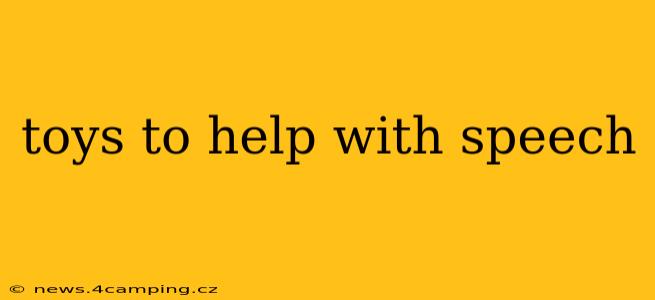Speech development is a crucial milestone in a child's life, and the right toys can significantly contribute to this process. From early babbling to forming complex sentences, playful engagement can foster essential language skills. This guide explores various toys categorized by the speech skills they target, offering valuable insights for parents and caregivers. We'll address common questions parents often have about selecting and utilizing these toys effectively.
What are the best toys for speech development?
The "best" toys depend on the child's age and developmental stage. However, generally, toys that encourage interaction, imitation, and communication are excellent choices. This includes toys that promote:
- Vocalization: Simple musical instruments, noise-making toys, and toys with different textures that encourage exploration through sound.
- Receptive Language: Picture books, shape sorters, and toys that require following simple instructions ("Put the block in the box").
- Expressive Language: Puppets, dolls, and role-playing toys that encourage imaginative play and verbal interaction.
- Articulation: Toys with tongue twisters or repetitive sounds, and toys that encourage clear pronunciation through imitation.
What toys help with speech delays?
For children experiencing speech delays, toys should be carefully selected to address specific areas of difficulty. Consult with a speech-language pathologist (SLP) for personalized recommendations. However, some general toy categories that can be helpful include:
- Cause and effect toys: These help build understanding of actions and their consequences, which is vital for language development.
- Toys that require following directions: This strengthens receptive language skills.
- Toys that encourage imitation: Repeating words and sounds helps practice articulation.
Remember, consistency and patience are key when using toys to address speech delays. Regular engagement with these toys, alongside professional therapy if needed, can make a significant difference.
How can I use toys to improve my child's speech?
The key is to make it fun and engaging! Here are some tips:
- Engage actively: Don't just hand your child a toy; play with them! Narrate your actions, describe the toys, and encourage them to participate verbally.
- Model correct speech: Speak clearly and use age-appropriate language.
- Focus on interaction: Use toys as a platform for back-and-forth communication. Ask questions, respond to their attempts at communication, and praise their efforts.
- Keep it playful: Learning should be enjoyable! If your child loses interest, switch to a different toy or activity.
- Be patient: Speech development takes time. Celebrate small successes and focus on progress, not perfection.
What are some examples of speech therapy toys?
While the term "speech therapy toys" might sound clinical, many everyday toys can support speech development. Here are a few examples:
- Building blocks: Great for vocabulary development (e.g., "big," "small," "red," "blue").
- Picture books: Enhance vocabulary and narrative skills.
- Singing and musical toys: Encourage vocalization and rhythm.
- Puppets: Stimulate imaginative play and conversation.
- Play-Doh: Develops fine motor skills crucial for speech production.
At what age should I start using speech therapy toys?
You can start using toys to support speech development from infancy. Babies respond to sounds and textures, and even simple rattles can help stimulate vocalization. As children grow, you can introduce more complex toys that challenge their language skills.
Are there any specific toys recommended for toddlers with speech delays?
Again, consultation with an SLP is crucial for toddlers with speech delays. However, toys that focus on building vocabulary, improving articulation, and enhancing receptive language are generally beneficial. This includes picture books with simple words, toys that involve imitating animal sounds, and cause-and-effect toys.
How do I know if my child needs speech therapy?
If you have concerns about your child's speech development, consult with your pediatrician or a speech-language pathologist. Early intervention is key, and professionals can assess your child's needs and provide appropriate support. Signs that might warrant professional evaluation include significant delays in talking, difficulty understanding simple instructions, limited vocabulary, or unclear pronunciation.
This comprehensive guide provides a starting point for parents seeking ways to enhance their child’s speech development. Remember that playful interaction and consistent engagement are key elements in fostering a child's communication abilities. Always consult with a speech-language pathologist for personalized advice and support, especially if you have any concerns about your child's speech development.
